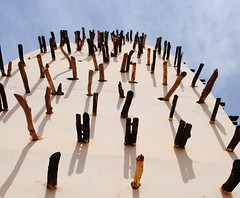You would think that the potholes, wasps stings and bazooka bearing military men would be enough to put us off Casamance but we can’t think of a more beautiful route.

Casamance is alive. The fresh air hums with the sound of colourful birdsong and the crickets buzz all day long. The region really is breathtakingly beautiful and we both struggle to avoid hitting the enormous potholes as we gaze out towards the rice fields or catch sight of an amazing bird.
From the road to Ziguinchor onwards the route became much tougher, it’s as though the Senegalese government has forgotten this place. Whilst the Dakar area enjoys newly surfaced roads, the people of Casamance struggle to travel a meagre 30 kilometers to the next village. Cars cannot pass these roads, it’s only the bush taxis and an occasional four-wheel drive that dare tread on the broken tarmac and dusty sand pistes.

With a little guilt we have to admit that we benefit from this lack of transportation in the region. With the cars scared away by the difficult conditions, our main encounters are with other cyclists, large groups of school bound children and groups of women travelling to the rice fields. The normal hazards of cycling alongside traffic have faded into the distance and our brakes now respond to the unpredictable crossing of goats, cattle and donkeys.

As we cycle towards the border with Mali we find ourselves reflecting upon the strange life we are living here. Eating and sleeping wherever the road takes us, filtering cool well water at regular stops and relying on solar power for all our electrical needs. Wherever we go we feel the same sense of self-sustainability through cycling. It’s an independent existence we are living, one that tastes of a pretty sweet freedom. It’s a nomad’s life.







